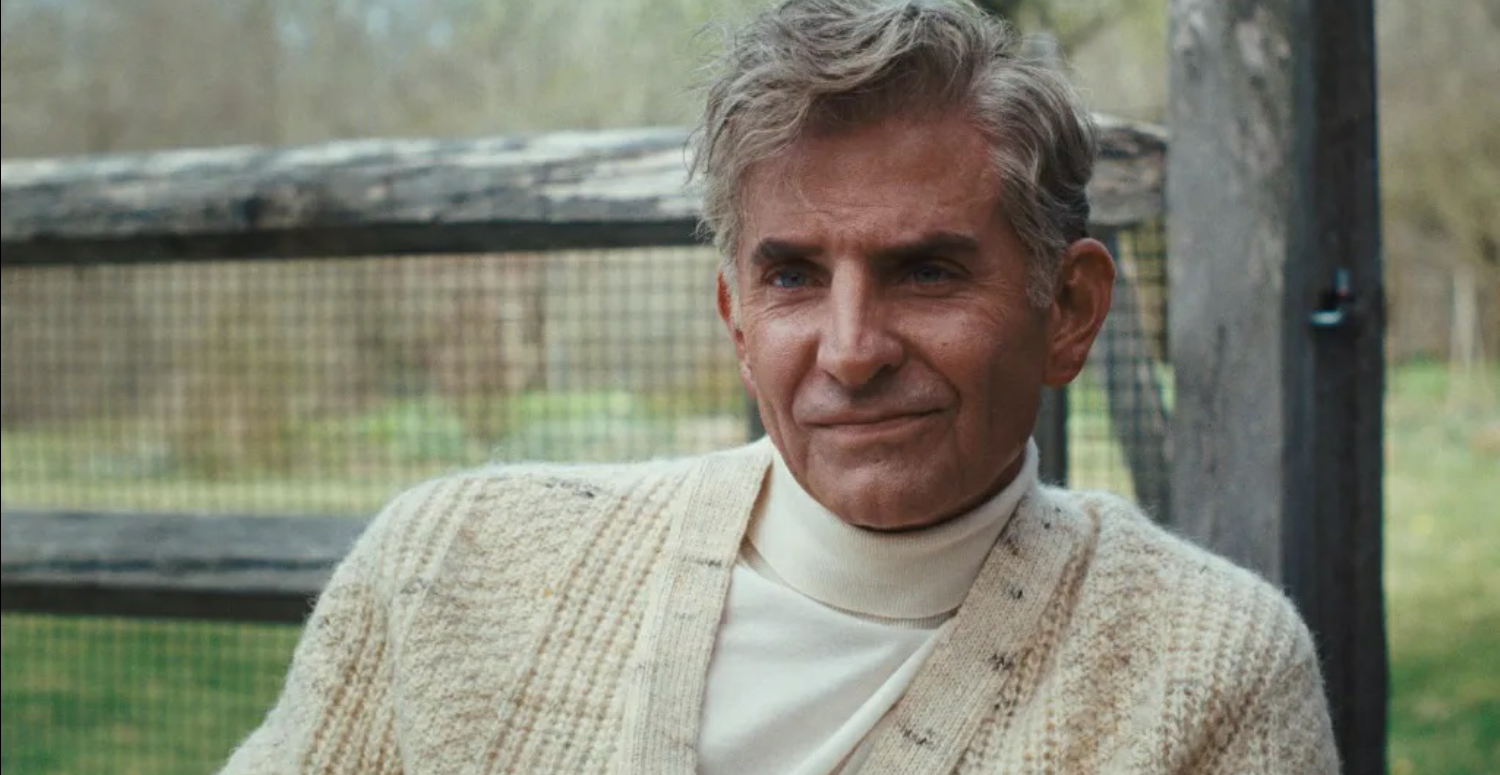Maestro
2023

FR EN
Un biopic sans fausse note ?
Cinq ans après avoir ressuscité le classique folk américain « A Star is Born », Bradley Cooper signe son deuxième film derrière la caméra en retraçant et en interprétant lui-même le portrait du compositeur et chef d’orchestre américain Leonard Bernstein, notamment célèbre dans le monde du cinéma pour sa B.O. de « West Side Story ».
Produit par Steven Spielberg (Amblin), Martin Scorsese (Sikelia) et Netflix, et disponible à l’international sur la plateforme de streaming, « Maestro » est un biopic validé par les descendants du protagoniste qui nous plonge dans sa vie, du coup de fil qui le plaça sur le devant de la scène à la mort de sa femme. Co-écrit avec Josh Singer (Spotlight), le scénario de Bradley Cooper s’attache à décrire la vie de couple qu’on ne connaissait pas de cet homme pourtant célèbre. C’est donc moins un film sur sa musique et sur son œuvre que sur sa vie, au fil de plusieurs décennies orchestrées à tour d’ellipses longue durée et de plongées dans l’intimité de ce couple.
C’est un récit d’amour et d’amours, une histoire de couple, et un regard intime sur un homme complexe. Le film illustre ainsi les dualités discordantes au cœur de cet homme avec d’une part sa sexualité et son amour à revendre, et d’autre part son conflit interne entre son identité de chef d’orchestre – homme de spectacle – et celle plus introvertie de compositeur – où le créateur doit être éloigné du monde. Bradley Cooper se plonge totalement dans le rôle et compose véritablement un personnage grâce à une grosse préparation en amont, un mimétisme millimétré, et un travail de maquillage et de prothèses remarquable. C’est donc avant tout un film d’acteurs offrant un duo de personnages parfaitement interprétés qui vaudra très certainement deux nominations aux Oscars pour Bradley Cooper (déjà nommé quatre fois) et Carey Mulligan (Promising Young Woman ; She Said ; Gatsby le Magnifique).
La qualité du jeu des acteurs est par ailleurs aidée par le travail de Kazu Hiro – vrai maître du maquillage qui a déjà remporté deux Oscars pour son travail sur Gary Oldman grimé en Churchill dans « Les Heures Sombres » et Charlize Theron dans « Scandal » – qui rend convaincant Léonard Bernstein aussi bien jeune qu’à 70 ans. Mais si les interprétations et le maquillage marquent plus que la réalisation, celle-ci est cependant moins classique qu’il n’y paraît avec des séquences sophistiquées et de belles idées : des raccourcis temporels stylisés subtilement montés par Michelle Tessoro à l’esthétique de scènes telle que le flirt du couple sur une scène vide seulement éclairée d’une maigre ampoule. Le chef opérateur Matthew Libatique fait une nouvelle fois preuve d’un magnifique sens du cadre dans un format académique (1 :37) et une alternance couleur et noir & blanc nous faisant naviguer entre les époques. Il varie ainsi les styles nous projetant presque à chaque fois dans le style cinématographique de l’époque.
« Maestro » est donc un biopic particulièrement bien réalisé et interprété sur l’ensemble de la vie d’un homme talentueux et compliqué mais qui ne s’intéresse pas à la portée culturelle du compositeur et peine à émerveiller ou bouleverser. Avec ses beaux plans et sa musique classique incarnée, de Mahler à « Mass », c’est aussi plus un film à voir en salles que sur petit écran, merci Netflix …
Raphaël Sallenave
A biopic with no false notes?
Five years after reviving the American folk classic “A Star is Born”, Bradley Cooper is back with his second film behind the camera, depicting and playing himself the American composer and conductor Leonard Bernstein, most famous in the film world for his soundtrack to “West Side Story”.
Produced by Steven Spielberg (Amblin), Martin Scorsese (Sikelia) and Netflix, and available internationally on the streaming platform, “Maestro” is a biopic endorsed by the protagonist’s descendants, taking us on a journey through his life, from the phone call that brought him to prominence to the death of his wife. Co-written with Josh Singer (Spotlight), Bradley Cooper’s screenplay focuses on the unfamiliar couple life of this famous man. So, it’s less a film about his music and his work than about his life, over several decades, orchestrated with long ellipses and in-depth glimpses into the intimacy of this couple.
This is a story of love and loves, a story of a couple, and an intimate look at a complicated man. The film captures the conflicting dualities at the heart of this man, with on the one hand his sexuality and his love to spare, and on the other his internal split between his identity as a conductor – a showman – and his more introverted identity as a composer – where the creator must be detached from the world. Bradley Cooper fully immerses himself in the role, creating a real character thanks to a great deal of prior training, meticulous mimicry and remarkable make-up and prosthetic work. Above all, then, this is an actor’s movie, with a pair of perfectly played characters that will certainly earn Bradley Cooper (already nominated four times) and Carey Mulligan (Promising Young Woman; She Said; The Great Gatsby) two Oscar nominations.
The quality of the acting is further enhanced by Kazu Hiro’s work – a true make-up wizard who has already won two Oscars for his work on Gary Oldman as Churchill in “The Darkest Hours” and Charlize Theron in “Bombshell” – who convincingly brings Leonard Bernstein to life both as a young man and in his 70s. But while the performances and make-up are more striking than the direction, the latter is less classical than it seems, with a number of sophisticated sequences and great creative ideas: from the stylized temporal shortcuts subtly edited by Michelle Tessoro to the aesthetics of scenes such as the couple’s courtship on an empty stage lit only by a meager light bulb. Director of photography Matthew Libatique once again demonstrates a wonderful sense of framing in an academic format (1:37), with alternating color and black & white shots that take us back and forth between eras. He indeed mixes up the styles, projecting us almost every time into the cinematic language of each era.
“Maestro” is therefore a particularly well-made and well-acted biopic about the whole life of a talented and complicated man, but which does not focus on the composer’s cultural impact, and struggles to amaze or deeply move us. With its beautiful shots and embodied classical music, from Mahler to “Mass”, it’s also more a film to be seen in cinemas than on the small screen, so thank you Netflix …
Raphaël Sallenave

